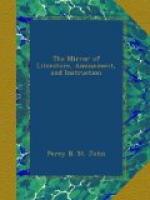Mr. Mackintosh, contractor for the government works at Stonehouse Point, Devon, lately had to descend in the diving-bell with workmen to lay the foundation of a sea wall. The machine is fitted with convex glasses, in the upper part, to serve the purpose of windows; and Mr. Mackintosh states, that on several occasions, in clear weather, he has witnessed the sun’s rays so concentrated by the circular windows, as to burn the labourers’ clothes, when opposed to the focal point, and this when the machine was twenty-five feet under the surface of the water!—From the MS. Journal of the Bristol Nursery Library.
The Cowslip and Polyanthus.
By sowing the seed of the wild cowslip in the garden, a number of varieties will be produced, some of which have flowers of a beautiful bright red colour. May not this process be the first step towards the formation of our garden polyanthus? if that be not, as is generally supposed, a variety of the primrose, rather than of the cowslip.—Gard. Mag.
French Method of making Coffee.
The principal points are these:—The coffee,—Turkey or Bourbon,—should be roasted only till it is of a cinnamon colour, and closely covered up during the process of roasting. In France this is done in closed iron cylinders, turned over a fire by a handle, like a grindstone. The coffee should be coarsely ground soon after it is roasted, but not until quite cool: some think its aroma is better preserved by beating in a mortar, but this is tedious. The proportions for making coffee are usually one pint of boiling water to two and a half ounces of coffee. The coffee being put into the water, the coffee-pot should be covered up, and left for two hours surrounded with hot cinders, so as to keep up the temperature, without making the liquor boil. Occasionally stir it, and after two hours’ infusion, remove it from the fire, and allow it a quarter of an hour to settle, and when perfectly clear, decant it. Isinglass, or hartshorn shavings, are sometimes used to clarify coffee; but by this addition you lose a great portion of its delicious aroma.
Coffee in England is generally over-roasted, and to this fault arise all the inconveniences which are so often attributed to coffee, but which, in reality, are produced by the imperfect modes of its preparation.—From the Coffee-Drinker’s Manual, translated from the French.
Ivy.
Attached to the officers’ barracks at Winchester, is a very fine specimen of ivy; its trunk has been severed off to a height of more than two feet from the ground, yet it has for years continued in healthy vegetation.—Gard. Mag.
Parasite Sycamore.
In Kinmel Park, Denbighshire, is an oak tree, which, twenty or thirty years ago, lost one of its largest branches by the wind, and a partial decay was the consequence; a key from a neighbouring sycamore fell into the fracture, which, vegetating, has formed for the old mutilated oak a new head. This parasite appears to have so completely seated itself, that, though the place of its first lodgment is twelve feet from the ground, it is thought that its roots will very soon penetrate to the earth, and at last destroy its venerable nurse.—Ibid.




